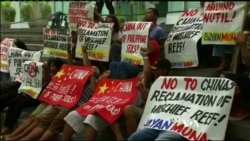North Korea's military ambitions and China's maritime claims will be two focal points for U.S. Secretary of State John Kerry's talks in Asia.
Kerry will hold talks in Beijing on Saturday and Sunday with top officials ahead of a Strategic and Economic Dialogue meeting this summer and President Xi Jinping’s planned visit to the U.S. in the autumn.
He then will travel to South Korea for talks with President Park Geun-hye and other officials on bilateral and regional issues.
Kerry’s visit to China comes at a time of heightened tensions over China's expanding land reclamation effort in disputed areas of the South China Sea. In particular, China has been strengthening such efforts in the Spratly Islands, parts of which are claimed by the Philippines, Vietnam, Malaysia, Brunei and Taiwan.
Earlier this week, U.S. officials said the Pentagon was considering sending military ships and planes to the South China Sea to assert freedom of navigation. That prompted a quick response from China’s foreign ministry, which said the move would be considered provocative.
In testimony before the Senate Foreign Relations Committee, David Shear, assistant secretary of defense for Asian and Pacific affairs, said Beijing’s buildup of reefs into artificial islands could have military dimensions that would be destabilizing for the region.
Greater risk of "miscalculation"
“These types of actions ... could prompt other regional governments to strengthen their own military capabilities at their outposts, increasing the risk of miscalculation, crisis and arms races,” said Shear.
He said China had greatly surpassed its neighbors with construction in the region.
“China’s reclamation of 2,000 acres [more than 800 hectares] just since early 2014 dwarfs the efforts of all of the other claimants, and this suggests new and troubling changes in the regional status quo,” said Shear.
Kerry’s visit to South Korea will take place just days after North Korea rattled its neighbors by saying it had test-fired a ballistic missile. The test could indicate progress in Pyongyang's secretive missile-building program.
The test prompted Republican U.S. Senator Cory Gardner of Colorado to criticize President Barack Obama, charging he has been unresponsive to a growing threat.
“This launch is the latest confirmation of Pyongyang’s growing nuclear and ballistic missile capabilities while the Obama administration seems to have fallen asleep at the switch with regard to our policy to deter the growing North Korea threat,” said Gardner.
Six-party talks with North Korea over its nuclear program stalled in 2008.
Review of process needed?
World powers do not have a lot of “will” right now to reopen the talks, said Korean studies analyst Katharine H.S. Moon, the SK-Korea Foundation Chair in Korea Studies and a senior fellow of the Brookings Institution’s Center for East Asia Policy Studies.
“I think people are burned out,” said Moon. “I think the six–party mechanism itself needs to be seriously reconsidered."
But Moon said it was unlikely that North Korea would intentionally use its weapons recklessly.
“They are not a crazy regime as many people assume they are or like to believe they are," she said. "It is quite rational and practical in terms of strategically, tactically using resources to grow areas of their military and the economy that they deem essential to the regime’s survival.”
She said North Korea has been “upping the ante” in terms of what kind of diplomatic negotiations would be necessary to work with Pyongyang and the costs that other parties would have to incur to get the North to reduce its nuclear capacity.
After his stop in South Korea, Kerry will travel to Seattle for U.S.-trade-related talks.






